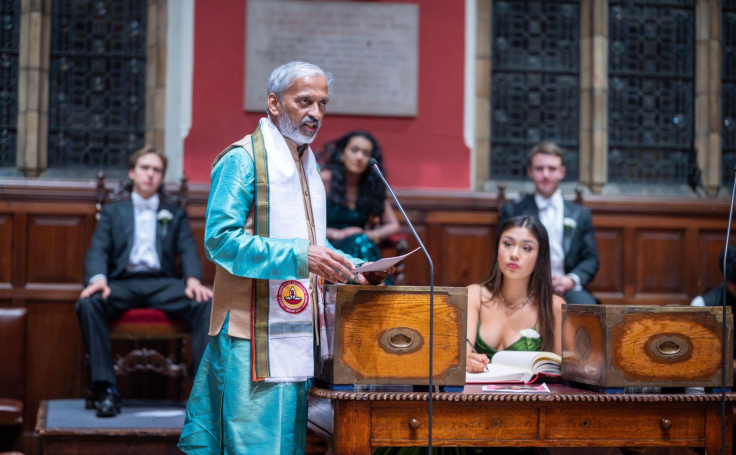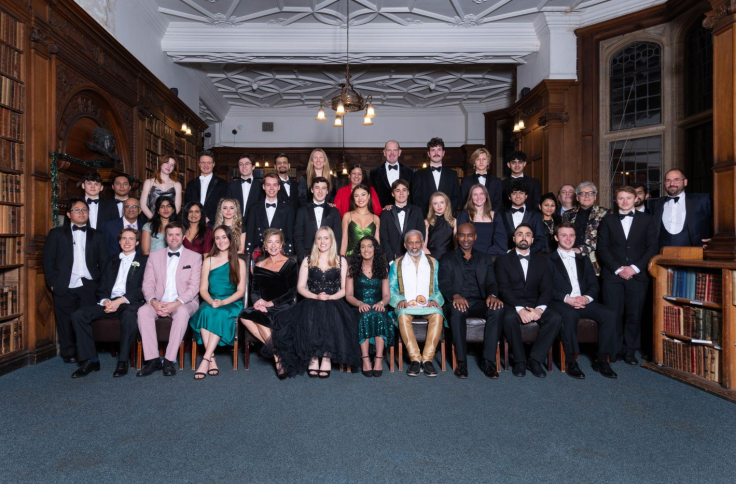Climate Healers Founder Dr. Sailesh Rao On Winning Side Of Oxford Union Debate On Going Vegan

Dr. Sailesh Rao, founder and executive director of lifestyle transformation and environmental restoration nonprofit Climate Healers, participated in a debate held by the historic Oxford Union Society on Nov. 30, with the proposition, "This House Would Go Vegan". Rao's side, which argued in favor of the proposition, won by a margin of 112-84.
The side in favor of the motion comprised Oxford Union president Disha Hegde, Rao, lifestyle medicine and wellness physician Dr. Chidi Ngwaba, and animal rights activist Joey Carbstrong. On the opposition side were Union president-elect Hannah Edwards, media personality Katie Hopkins, head of the Change in Agriculture research group Dr. David Rose, and Lincoln college student Manon Hammond.
The Oxford Union event began with a guided tour of the historic buildings in Frewin Court. Debate participants posed for group photos with the members of the Oxford Union, and it was followed by a 100% vegan dinner served to all participants.
The debate proper was opened by Hegde, arguing for the proposition and introducing the speakers for the opposition. She was followed by Edwards, who spoke first for the opposition and introduced the speakers for the proposition.
Rao was the second speaker for the proposition, and he delivered an almost 10-minute speech on the environmental case for the house to go vegan, backed up by research from various sources. Among all the speakers, Rao was the only one to not get interrupted for a point of information.
Rao's speech called attention to the "cow in the room" that many people are ignoring, which is that animal agriculture has a huge impact on anthropogenic climate change. He implored the audience to "go vegan" rather than "be vegan", highlighting that it is a journey, not a destination.
"It is undeniable that human civilization has adversely impacted life-support systems on the planet," Rao said, adding, "Scientists have identified nine planetary boundaries that we must stay within for the sustainability of life on Earth. At the moment, we have transgressed six of them and any one of these transgressions could end life as we know it. The good news is that when we Go Vegan, we help resolve all six of them. That's the power we have as individuals to reverse our existential crisis."
Rao also argued that animal agriculture is the leading cause of ecological destruction because it uses 37% of the ice-free land area of the planet as a grazing area for farmed animals. Meanwhile, industrial fisheries conduct incredibly destructive bottom trawling on an area of the ocean floor the size of South America every year.
While the burning of fossil fuels is the most recognized driver of climate change, Rao said that animal agriculture is responsible for at least 87% of greenhouse gasses on an annual basis, factoring in the potential carbon absorption of the forest land cleared for animal agriculture.
"The cessation of animal agriculture will result in healthy oceans, healthy forests, and healthy soils, and if we want to reverse climate change, then we must adopt a strategy that can draw down greenhouse gasses from the atmosphere. Healthy oceans and sea forests can do that. Healthy soils and trees can do that. Solar panels and electric cars cannot," Rao said.
"Now, I am not a supporter of the fossil-fuel industry – far from it. It is my engineering assessment that we must wean ourselves off fossil fuels gradually. But we burn fossil fuels to heat and cool our homes, to transport ourselves, to manufacture goods, to ship goods. These are all social goods," he added.

"What social good comes from animal agriculture? Nothing. Only obesity, heart disease, diabetes, cancer, biodiversity destruction, soil depletion, fouling of our waterways, antibiotic resistance, dangerous and dehumanizing work, animal cruelty, climate catastrophe, world hunger and let's not forget pandemics. Indeed, there is nothing that will not improve when we end the cruelty and folly of exploiting animals," he further said.
Rao credited Glen Merzer, Carl LeBlond, Ken and Alison Hamje, Paul Papin, and Mythili Rao for their help in writing his speech, which took roughly 1.5 months for him to prepare. Following the speeches of all participants from both sides, the audience was asked to vote for the side they thought won by going out through the "aye" door or the "nay" door. According to Rao, the line for the "aye" door was so long that some people decided to go out the other door, which is why he believes the winning margin was larger than the official tally of 112-84.
Coming into 2024, Climate Healers says it is time for "all hands on deck" to help implement its seven-point solution to climate change, which will be unveiled soon. This solution contains seven strategic actions that people all over the world need to take to reduce the negative effects of climate change. Drawing on Rao's expertise as an engineer who has contributed to the advancement of internet and connectivity technology, these seek to solve the problem from a systems perspective by upgrading the world's infrastructure.
© Copyright IBTimes 2025. All rights reserved.





















